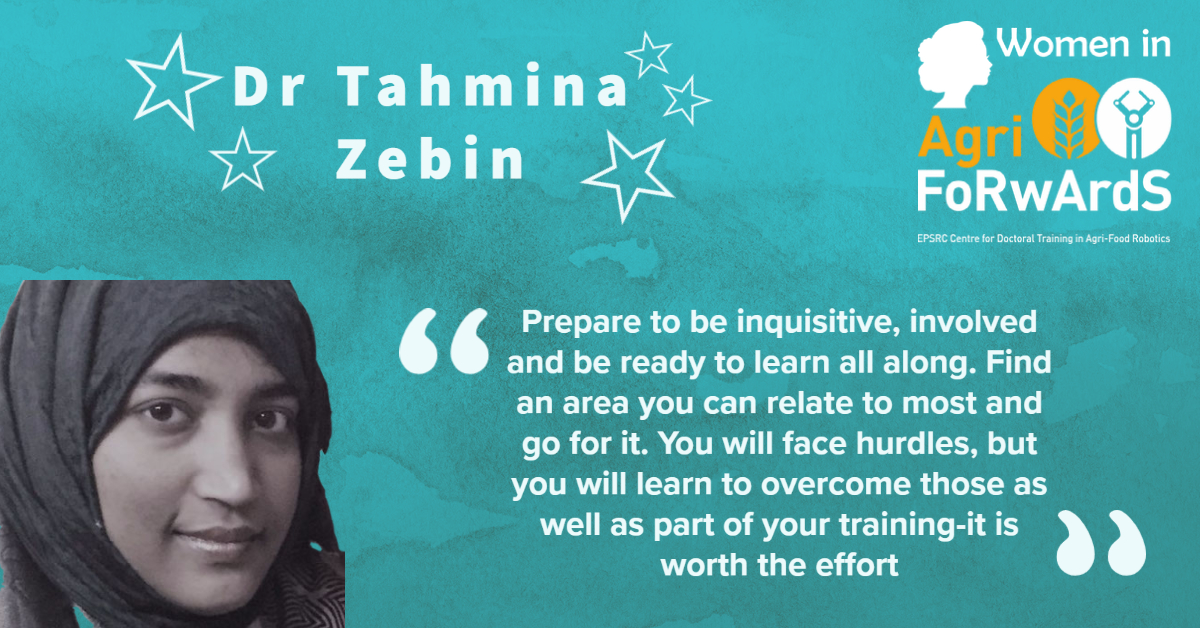To finish off our celebration of women in STEM this week, we would like to introduce you to Dr Tahmina Zebin. Tahmina is a Lecturer within the School of Computing Sciences at the University of East Anglia. She is also a member of the Smart Technologies Research Group.
Tahmina is currently leading on the On-device and Explainable AI work at the UEA. Her research expertise includes Advanced Image and Signal Processing, Explainable and Ethical AI, Human Activity Recognition, Risk Prediction Modelling using various statistical and deep learning techniques. She has worked on projects relating to disease detection from endoscopic videos and human activity recognition from wearable sensor data. Along with her research, Tahmina is also responsible for teaching undergraduate and postgraduate modules such as Artificial Intelligence, Data Mining, and Ubiquitous computing.

We asked Tahmina what inspired her to pursue a career in computing sciences.
“I grew up with my love for physics and mathematics, so I majored in Electronics and Communication Engineering from the University of Dhaka, Bangladesh. I then applied for a Scholarship at the University of Manchester to come to study for an MSc in Digital Image and Signal Processing at the School of Electrical and Electronic Engineering. I got a distinction for my MSc, and this led to a doctoral scholarship in the same research group I was part of during my MSc dissertation. The group was multidisciplinary, and I got to apply various machine learning and deep learning method on various sensor data and images coming from multiple healthcare settings. So, this was kind of my in-depth exposure to algorithm development and me being an electrical engineer, I also worked on deploying the models I was training to do inference on edge computing devices such as smartphones or smartwatches. Though I hold a lectureship in computing Sciences now, my work is still multidisciplinary in nature.”
And what she enjoys most about her job,
“I enjoy the fact that in academia I get to collaborate with industrial partners often, within my area of expertise, I can be involved in exciting projects as a consultant. This is a perfect exposure to both worlds with me being able to be a part of the force that is trying to solve constantly evolving real-world problems with real impact. Another interesting facet is, I can mentor my students to prepare for their careers facilitating them with transferrable skills based on my experience. Let’s say I can set coursework with real-world case studies to train them well on the needs for a specific sector. I also get to share my ideas with my students, colleagues, industry partners and vice versa. I find it very rewarding to be a part of such a wonderful setting in academia.”
And what advice she would give someone thinking about a career in science.
The study of science is full of excitement – the field is constantly evolving, and you get to be a part of the thrill of seeing or making sense of existing solutions or figuring out something that no one has done before. So, prepare to be inquisitive, involved and be ready to learn all along. Find an area you can relate to most and go for it. You will face hurdles, but you will learn to overcome those as well as part of your training-it is worth the effort! Also, don’t hesitate to ask for feedback and suggestions from peers and colleagues whenever you are stuck, it helps the progress immensely!
And finally, the most memorable moments of her career so far;
Being selected for my MSc and PhD studentships to pursue further studies in the UK, Getting a PhD degree as the first girl in my family; Getting funded for research projects, Securing a permanent lectureship and being able to lead my own team!
